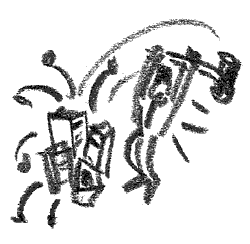Destroying data
There is no computer function that can delete information. Strictly speaking, computers can only write new information to the hard drive. When you choose to delete a file in Windows, you are simply telling the computer that this space is now available to be overwritten with new data (even though it appears as 'free space'). Windows removes the file icon from your screen, as though the file is no longer there. However, it cannot delete the data from the hard drive. You can compare this to removing the label from a filing cabinet, but leaving the files in the drawer. The only way to physically remove data from the hard drive is to overwrite it with something else. This is a very difficult process to perform manually (since you cannot see the actual place on the hard drive where your data was written). We need to use software that knows how to overwrite unwanted files with random data.
Between 2000 and 2002, researchers Simson Garfinkel and Abhi Shelat of MIT purchased a large number of second-hand hard disks from various dealers through eBay and examined these for any residual information they contained. They were able to recover over 6000 credit card numbers and cached Web pages where some of these were used, medical records, love letters and pornographic images amongst other material. One hard drive appeared to have come from a bank machine in Illinois.
Exercise: Install the https://securityinabox.org/en/guide/recuva/windows tool. Practice deleting and then restoring deleted data from your computer or USB memory stick.
In order to ensure that deleted information really is destroyed, you will have to rely on special software that removes the data securely and permanently. Using these tools is akin to shredding a paper document rather than simply tossing it into a bin and hoping that nobody finds it.
Exercise: Install and practice using CCleaner from https://securityinabox.org/en/guide/ccleaner/windows
Note: Your computer or digital memory device will contain previously deleted files that can be recovered. Since you can no longer see those files on your screen, you cannot overwrite them with CCleaner. There is a special feature for wiping all remnants of recoverable files from the free space of your device. Its called 'Wipe empty space' and it should be run on all memory devices at least once. This will ensure that the empty space on your device really is, empty.

